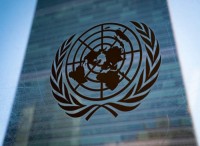Rassegne stampa

UN says leaving Afghanistan would be 'heartbreaking'
Associated Press writer Rahim Faiez contributed from Islamabad
21-04-2023 - UNITED NATIONS -- The United Nations is ready to take the “heartbreaking” decision to pull out of Afghanistan in May if it can’t persuade the Taliban to let local women work for the organization, the head of the U.N. Development Program said.U.N. officials are negotiating with the Afghan government in the hope that it will make exceptions to an edict this month barring local women from U.N. work, UNDP Administrator Achim Steiner told The Associated Press.
“It is fair to say that where we are right now is the entire United Nations system having to take a step back and reevaluating its ability to operate there," Steiner said. “But it’s not about negotiating fundamental principles, human rights.”
U.N. Secretary-General António Guterres’ spokesman, Stéphane Dujarric, said Tuesday that the United Nations remains committed to helping the people of Afghanistan and continues “to push back on this counterproductive, to say the least, edict by the authorities.”
The Taliban have allowed Afghan women to engage in some work, Steiner said, and a U.N. report released Tuesday shows that the country desperately needs more women working, with its economy flailing.
The Taliban takeover has been accompanied by some very modest signs of economic recovery. There has been some increase in exports, some exchange rate stabilization and less inflation. But gross domestic product, the sum of all goods and services produced within Afghanistan's borders, is expected to be outstripped by population growth, meaning that per capita income will decline from $359 in 2022 to $345 in 2024, the report says.
Some of those economic problems are due to Taliban policies keeping most women out of the workplace, Steiner said. Those economic problems mean more need in the country, but the U.N. has decided that human rights are non-negotiable and it will leave in May if the Taliban do not relent.
“I think there is no other way of putting it than heartbreaking,” Steiner said in Monday's interview. “I mean, if I were to imagine the U.N. family not being in Afghanistan today, I have before me these images of millions of young girls, young boys, fathers, mothers, who essentially will not have enough to eat.”
A source of faint optimism is the Taliban’s allowing women to work in specific circumstances in health, education and some small businesses.
“In one sense, the de facto authorities have enabled the U.N. to roll out a significant humanitarian and also emergency development assistance set of activities," Steiner said. “But they also continuously are shifting the goalposts, issuing new edicts.”
Despite initial promises of a more moderate rule than during their previous stint in power in the 1990s, the Taliban have imposed harsh measures since taking over the country in 2021 as U.S. and NATO forces were pulling out of Afghanistan after two decades of war.
A spokesman for the Afghan Economy Ministry, Abdul Rahman Habib, told the AP that international banking restrictions, the halt in humanitarian assistance and climate change explain the country’s poverty rate and poor economy.
However, he cited lower inflation and dependence on imports, improved regional trade and business relations, and the eradication of poppy cultivation as signs of economic progress and good governance.
“Our future plans and priorities are developing the agricultural and industrial sectors as well as mining extraction, supporting domestic business and domestic products, more focus on exports, attracting domestic and foreign investors, creating special economic zones and much more,” Habib said.
This month the Taliban took a step further in the restrictive measures they have imposed on women and said that female Afghan staffers employed with the U.N. mission can no longer report for work.
“This is a very fundamental moment that we’re approaching,” Steiner said. “And obviously our hope and expectation is that there will be some common sense prevailing.”
Aid agencies have been providing food, education and health care support to Afghans since the Taliban takeover and the economic collapse that followed it. No country has recognized the Taliban as the legitimate government of Afghanistan, and the country’s seat at the U.N. is held by the former government of President Ashraf Ghani.
The 3,300 Afghans employed by the U.N. — 2,700 men and 600 women — have stayed home since April 12 but continue to work and will be paid, Dujarric has said. The U.N.’s 600 international staff, including 200 women, is not affected by the Taliban ban.
“We are reviewing how we can do our work and how we can do it while respecting international human rights law,” he said Tuesday. “We are doing everything we can to see how we can continue to do that.”
//abcnews.go.com/Politics/wireStory/leaving-afghanistan-heartbreaking-98657393
Redazione
Rassegne stampa
11-07-2024 - GD - Roma, 9 lug. 24 - Ci risiamo. I codardi russi continuano a bombardare da grande distanza i civili ucraini. Il barbaro attacco di ieri all’ospedale...
20-06-2024 - Una ricompensa da 10 milioni di dollari sulla sua testa, «Specially Designated Global Terrorist» dal 2008 per il Dipartimento di Stato Usa, a lungo...
20-06-2024 - AFGHANISTAN
A pochi giorni da un’importante conferenza dell’Onu sull’Afghanistan, botta e risposta tra Richard Bennett, relatore speciale delle...
14-06-2024 - Quale futuro per la difesa europea? La domanda è stata posta con forza durante il convegno organizzato dal Centro Studi Machiavelli che si è tenuto...
08-06-2024 - La cultura dominante sulle nuove imprese dimentica l'importanza di una solida politica industriale per le piccole e medie imprese italiane dell'aerospazio,...





